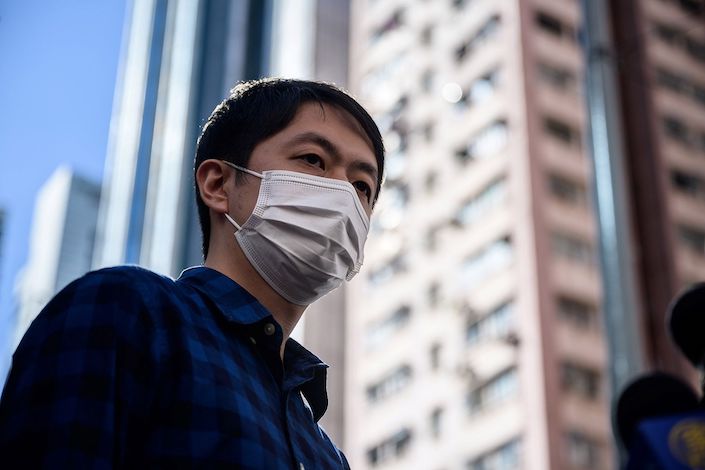Former HK Lawmaker’s Frozen Accounts Drag HSBC Into Political Turmoil

(Bloomberg) — HSBC Holdings Plc once again found itself in the middle of the debate over Hong Kong’s political future after a former pro-democracy legislator criticized the bank for freezing accounts he and his family held.
Former lawmaker Ted Hui, who fled to the U.K. amid a police investigation in Hong Kong, said over the weekend that the British bank and other local lenders froze his and his family’s accounts in the Asian financial hub. His family was able to transfer out their savings after the accounts were “suddenly unfrozen,” he said later in a Facebook post. Local media reported Monday that police ordered HSBC to again block accounts belonging to Hui, his parents and his wife.
In one of his posts, Hui called the incident “extremely serious” as it affected not just his family but the confidence of HSBC customers everywhere. China’s imposition of controversial new security measures eroded faith in the city’s banking system, he wrote.
On Monday afternoon, Senior Superintendent Steve Li Kwai-wah of the Hong Kong Police Force’s National Security Department said the request to block accounts was based on a probe into Hui’s previous crowd-funding efforts. In an earlier statement that didn’t name Hui, the police said accounts related to a case were frozen as part of an investigation into money laundering and suspected violations of the city’s national security law, including “collusion” with foreign forces.
“We have to abide by the laws of the jurisdiction in which we operate,” a Hong Kong-based spokesperson for HSBC said. “While we are unable to comment on matters concerning specific account activity, we are disappointed to see the circumstances being misrepresented.”
It’s the latest Hong Kong development to embroil HSBC in the complicated geopolitics of the former British colony, where local pro-democracy politicians have been disqualified, charged and arrested or fled into exile amid a broader China-backed crackdown on the political opposition. China’s actions have also drawn a slate of sanctions from Washington, dragging global banks into the political back-and-forth at a time when they have big expansion plans for Asia’s largest economy.
The tensions have forced London-based HSBC, which derives more than a third of its revenue from Hong Kong, into a precarious balancing act as its seeks to avoid drawing the ire of clients in the city and politicians on both sides. The lender is also in the midst of a massive restructuring, making a pivot to mainland China and Asia and away from unprofitable markets in Europe and the U.S.
The bank’s shares slid 1.9% to HK$42.90 ($5.54) in Hong Kong and are down about 30% this year.
The lender was also criticized as sometimes-violent protests engulfed the city in 2019. It became a target of protesters’ anger after closing an account linked to the city’s pro-democracy movement. Two historic bronze lions outside of the bank’s towering main Hong Kong headquarters were defaced as part of the protests.
HSBC was also rebuked by British and U.S. politicians after the bank’s Asia chief Peter Wong signed a petition in support of the controversial China-drafted national security law that was imposed by Beijing on Hong Kong over the summer.
Foreign governments led by the U.S. and the U.K. criticized the sweeping new security measures, which target political crimes in addition to terrorism, for eroding the unique freedoms Beijing promised to protect when Britain returned the city to Chinese rule in 1997.
Extremely Serious
“I think the incident is extremely serious,” Hui wrote. “It reflects that banks can arbitrarily freeze citizens’ assets due to political pressure under the National Security Law, severely impacting the credibility of Hong Kong’s banking and financial system.” He urged local and international regulatory agencies to investigate the incident and to “severely punish law enforcement officers and bank managers who abuse their power.”
Hang Seng, part of the HSBC Group, and Bank of China were named as Hui’s other banks in a South China Morning Post (SCMP) report. Logo Lo, a spokesman with Hang Seng, said the bank doesn’t comment on details of individual accounts. Bank of China declined to comment.
Five accounts belonging to Hui, his wife and parents had been inaccessible since Saturday, he said in an interview with the SCMP. Hui said he discovered the problem when he logged onto his online bank accounts, which weren’t functioning, the Post reported. The accounts contain his family’s “life savings,” Hui said in the interview.
When he contacted the banks, Hui was told that they could provide no further information, the report quoted him as saying. Hui said last week that he was going into exile in the U.K. after earlier fleeing to Denmark.
He was one of a group of people arrested last month in connection with a protest in the legislative chamber in May. Hui quit in November as part of a mass resignation by opposition legislators over the government’s ouster of four of their members.
The U.S., which sanctioned Hong Kong Chief Executive Carrie Lam and several other officials responsible for the city, set a mid-December deadline to identify banks for penalties under a law passed earlier this year in support of the local democracy movement.
Banks including Citigroup Inc. and Standard Chartered Plc have stepped up scrutiny of banking clients in Hong Kong, aiming to avoid violating U.S. sanctions. Washington is preparing to sanction at least a dozen more Chinese officials over their role in the recent disqualification of Hong Kong legislators, people familiar with the matter said.
American Secretary of State Michael Pompeo last week accused Hong Kong of using the courts to engage in “political persecution.”
Download our app to receive breaking news alerts and read the news on the go.

- MOST POPULAR




